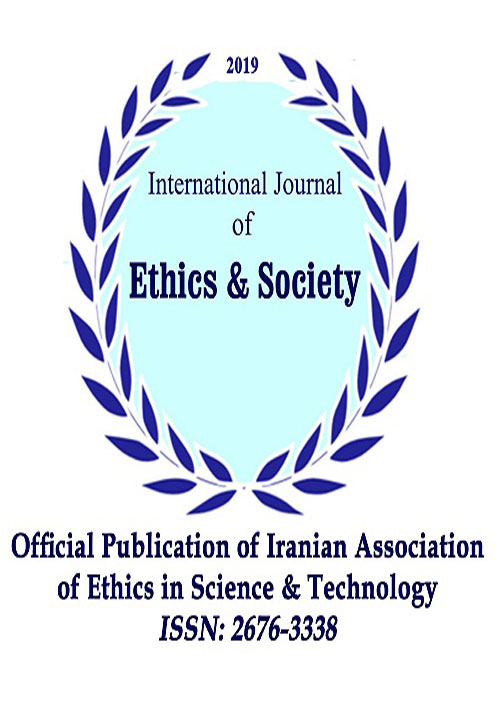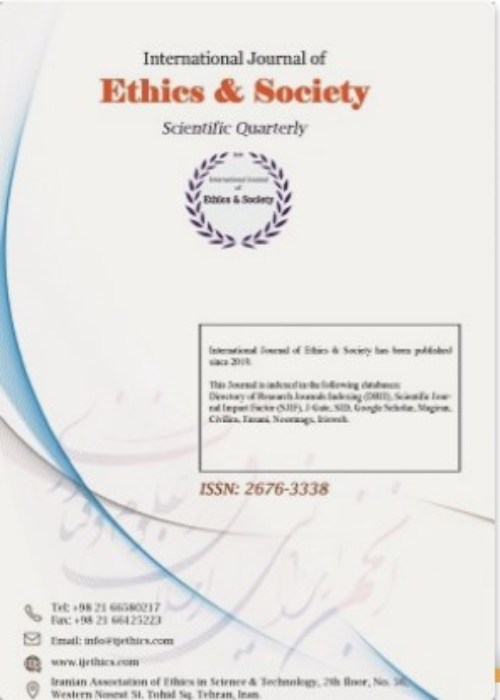فهرست مطالب

International Journal of Ethics & Society
Volume:3 Issue: 2, Summer 2021
- تاریخ انتشار: 1400/06/06
- تعداد عناوین: 8
-
-
Pages 1-5Background
The discussion of the consequences of unethical behavior in the financial reporting process, in itself, leads to other socio-economic consequences. This article explores how financial reporting immorality triggers a flood of other unintended consequences and has detrimental effects on everyone in a community. It is also explained that identifying and finding the causes of social and economic harms is preferable to solving the problems that follow because, as the saying goes, prevention is better than cure.
ConclusionSince the reliability and reliability of financial reports has a direct relationship with the moral health of its producers, it seems necessary to find the root and cause of immoral behavior, meet the needs, develop laws and deterrent penalties. And also spread values and virtues in society and the workplace. This process will enable accountants to withstand the negative pressures of the workplace, carnal desires, and financial and economic problems, and to choose the path of ethics in two ways.
Keywords: Economic, social consequences, Reporting consequences, Immoral behavior -
Pages 6-15Background
No doubt, A. J. Ayer is one of the contemporary philosophers who has unorthodox ideas in the domain of religion and ethics. In the domain of epistemology, Ayer believed that failure of “analysis” or “empirical proof” will lead to the meaninglessness of the proposition. Thus conceived, theological propositions are nonsensical while moral propositions are mere expression of feelings and then both of them are considered to be meaningless.
ConclusionThe author believes that a major part of the ideas of Ayer is derived from such analytic philosophers as Russell and Early Wittgenstein. The objective of the present essay is the demonstration of the latter claim through the study and explication of the religious and moral ideas of Ayer. This essay is written based on the method of documentation and analysis. Among the results of this essay, one can refer to the demonstration of the deep influence of Russell and Early Wittgenstein on the religious and moral ideas of A. J. Ayer.
Keywords: Ayer, Russell, Early Wittgenstein, Ethics, Religion -
Pages 16-26Background
Ethics are closely tied to people’s beliefs, values, and ideals, and custom assumes a special sacredness for morality. The present study attempts to investigate the role of ethics in civil liability law and the ethical aspects of fault and compensation of damages arising from faults. Through analyzing ethics and its philosophy as well as investigating the ethical theories, the present study also aims to investigate the effects of ethics on civil liability theories. Moreover, by examining the contents of the first part, this study examines the principles of civil liability of the transport operator.
ConclusionRegarding human’s ethical liability, there are two main views in ethical philosophy. First, there is a retrospective view stating that human is responsible for his decision-making power and voluntary actions. Second view is a prospective one holding human responsible for the consequences of his/her actions. Much of the theory of civil liability is inspired by these two views. In the field of transportation, the legal relationship between the sender and the operator of the multimodal transport, under a single contract, is called the multimodal transport contract. The basis of transport operator liability in single-mode conventions is diverse. The basis of liability in The Hague and Warsaw Conventions is based on fault. As for the liability of operators of shipping terminals in international trade (1994), the Hamburg, CMR, CIM, Montreal and the United Nations Conventions are based on presumed liability.
Keywords: Ethics, Civil liability, Principles, Carrier -
Pages 27-35Background
Reason is one of the main elements of criminal proceedings. Historically, criminal justice systems are usually divided into two general types: in the first type, called the "legal evidence system", the reason is only what is stated in the law, and therefore the judge has the right to document his sentence other than It does not have. In the second category, which is called the "system of persuasion of the judge", in addition to the evidence permitted by law, the judge can study other evidence and even evaluate, injure and modify the evidence presented, but the issue that is important and is very important from a legal and moral point of view is the basis of the judgechr('39')s knowledge and how to achieve it. Therefore, the purpose of this article is to analyze science and knowledge from a philosophical-ethical perspective from the perspective of evidence of criminal litigation to provide the conditions for explaining the knowledge of the judge and ways to achieve this knowledge as the most important evidence of litigation.
ConclusionThe knowledge of the judge is one of the positive reasons in criminal cases that obtained as a result of examination, exploration, and investigation of the judge in the referral cases for him. Science can be valid and cited when the reasons for achieving it are legal and in accordance with judicial ethics. Therefore, personal knowledge that does not have a rational and legal basis and origin cannot be a criterion and document for issuing a judgechr('39')s verdict.
Keywords: science, knowledge, ethics, criminal litigation, judge knowledge -
Pages 36-43Background
Benefiting from environmental ethics is a prerequisite for solving environmental problems. On the other hand, it seems unlikely to solve these problems without considering the social capital of society, so this study was conducted to identify environmental ethics and the impact of social capital on it.
MethodIt is an applied correlation research. The statistical population of this study was all farmer, 178 of whom were selected as a statistical sample based on Bartlett table and random sampling method. A researcher made questionnaire was used to collect information. Data were analyzed by Pearson and Spearman correlation and multi-regression analysis.
ResultsThe results indicate that social capital and all its components are correlated with environmental ethics at the level of 0.001%.
ConclusionThe results indicate that the promotion of social capital among farmers can improve environmental ethics and therefore in the end, some suggestions have been made based on this.
Keywords: Environmental ethics, Social capital, Ethics -
Pages 44-51Background
Today, ethics has become an integral part of human life and moral behavior plays an important role in improving the performance and effectiveness of organizations. As a result, this study aimed to determine the role of emotional and cognitive empathy, moral metacognition and quality of life in predicting moral behavior nurses.
MethodThe present study was cross-sectional from type of correlation. The study population includes nurses the hospitals of Varamin city in 2019 (N=359) which from them 200 nurses were selected as a sample by stratified random sampling method. Data were collected by the questionnaires of emotional and cognitive empathy (Reniers et al), moral metacognition (McMahon & Good), quality of life (WHO) and moral behavior (Swanson & Hill). Data were analyzed by Pearson correlation coefficient and multiple regression with enter model methods in SPSS-19 software.
ResultsThe findings showed that emotional empathy, cognitive empathy, moral metacognition and quality of life had a positive and significant relationship with moral behavior of nurses. In addition, the variables of emotional and cognitive empathy, moral metacognition and quality of life were able to predict 56% of the changes in moral behavior of nurses (P<0.01).
ConclusionAccording to the results, to improve the moral behavior of nurses, their emotional and cognitive empathy, moral metacognition and quality of life can be improved.
Keywords: Emotional, cognitive empathy, Moral metacognition, Quality of life, Moral behavior, Nurses -
Pages 52-62Background
Regarded to the rapid and increasing growth of science and technology, yet one of the main challenges of todaychr('39')s human beings is the issue of ethical and social education. As a result, this study was conducted with the aim of identifying the effective factors on ethical and social education of students with emphasis on the fundamental reform document of education.
MethodThis study in terms of purpose was applied and in terms of implementation was qualitative from type of content analysis. The research community was documents and resources and experts of education. The research sample was documents and resources related to ethical and social education and 22 experts of education who according to the principle of theoretical saturation were selected by purposive sampling method. Data were collected by take noting and semi-structured interview methods and were analyzed by content analysis method in three stages of open, axial and selective coding through MAXQDA software.
ResultsThe findings showed that ethical and social education of students with emphasis on the fundamental reform document of education had 35 sub-factors and 6 main factors (factors of individual, family, local community, school, media and information technologies and changes in the world community). Finally, according to the sub and main factors, was designed the conceptual pattern of effective factors on ethical and social education of students with emphasis on the fundamental reform document of education.
ConclusionBased on the pattern of ethical and social education of present research, education specialists and planners can design and implement programs to improve the ethical and social education of students.
Keywords: Ethical education, Social education, Students, Fundamental reform document, Education -
Pages 63-72Background
Organizational politics within organizations, like the power around the manager, is broad and widespread, and managers consider political behavior as a part of organizational life that is inevitable, and on the other hand, the impact of ethics on social and especially political behaviors is undeniable. Therefore, the purpose of this study was to design and validate organizational policy indicators based on political ethics.
MethodThe method of the present study was integrated (qualitative and quantitative) and in terms of purpose was applied research. The qualitative section consisted of experts with experience in the field of political behavior who interviewed 11 people using purposive sampling. The texts of the interviews were also analyzed by coding method. In the quantitative part, the statistical population was the heads and experts of the Ministry of Interior (101 people). The sample size was selected based on Morgan and Krejcie table of 80 people by random sampling method. The research instrument was a completed questionnaire with 3 dimensions, 10 components and 99 indicators, the reliability of which was obtained by Cronbachchr('39')s alpha test of 0.91. Structural equations with Smart Pls software were used to analyze the data.
ResultsThe results showed that the organizational, personal and job dimensions had (0.57, 0.44, 0.37) direction coefficient in the organizational policy model based on political ethics, respectively, and the research variables could be 0.66, the perception variable. Predict organizational policy based on political ethics. Also, the overall fit of the model was evaluated at a very high level (GOF = 0.59).
ConclusionThe model of perception of organizational policy indicators based on political ethics with 3 dimensions and 10 components has a good fit and can be considered as a suitable model of political behavior in public and private organizations in Iran.
Keywords: Organizational policy, Political ethics, Organizational dimensions


